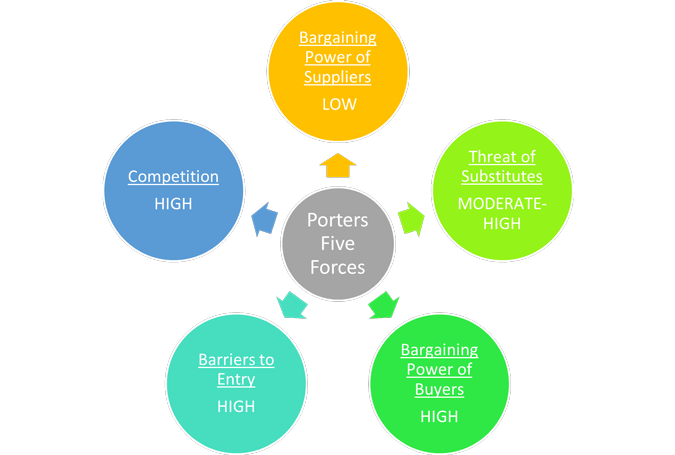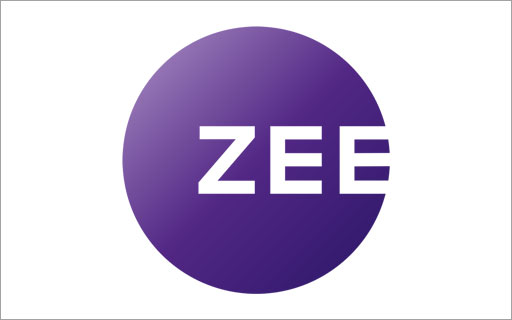India's Third Giant Leap
This Could be One of the Biggest Opportunities for Investors
- Home
- Outlook Arena
- Top Media Stocks in India
Top Media Stocks in India

The media industry in India is on the cusp of a strong phase of growth, backed by rising consumer demand and improving advertising revenue.
It is expected to grow to US$ 55-70 bn by 2030 at 10-12% CAGR, led by over-the-top (OTT), gaming, animation and visual effects (VFX).
Rising income and evolving lifestyles have led to a higher demand for services in the media and entertainment sector.
Higher rural penetration and a rapidly growing young population coupled with increased usage of 3G, 4G and portable devices have also augmented demand.
The Government of India (GoI) has supported the industry’s growth by taking various initiatives such as the digitization of cable distribution and ease of institutional finance to improve profitability for the sector.
Porter’s Five Forces Analysis of the Media Sector in India
Porter's Five Forces is a model that identifies and analyzes five competitive forces that shape every industry.
These are barriers to entry, bargaining power of suppliers, bargaining power of customers, threat of substitutes and competition within the industry.
A change in any of the forces normally requires a company to re-assess the marketplace.
Let us have a look at how these five forces shape the media sector -
#1 Barriers to Entry
The most attractive segment is one in which barriers to entry are high as they restrict the threat of new entrants.
Conversely if the barriers are low, the risk of new companies venturing into a given market is high.
In the media sector, barriers to entry are high, for broadcasting since it is very capital-intensive. They are low for content providers.
#2 Bargaining Power of Suppliers
The bargaining power of customers is the ability of suppliers to put the firm under pressure. Suppliers may refuse to work with the firm or charge excessively high prices for unique resources.
This is low in the media industry, as the number of suppliers is high. There is an increasing number of content providers.
#3 Bargaining Power of Customers
The bargaining power of customers is the ability of customers to put the firm under pressure. It is high if buyers have many alternatives and low if they have few choices.
In the media sector, the bargaining power of customers is high, as a variety of entertainment sources are available.
#4 Competition
For most industries, having an understanding of the competition is vital to successfully marketing a product.
The competition in the media industry is high, especially in Hindi dailies and regional print media too. Competition is also high amongst broadcasters especially for general entertainment channels.
#5 Threat of Substitutes
A substitute product uses a different technology to try to solve the same economic need.
This is high for the media sector, as the internet as well as significant cultural events/sporting events pose a significant threat to existing forms of media and entertainment.
Porters Five Forces Analysis of the Media Sector in India

When to Invest in Media Stocks
The media sector has provided investors healthy returns in certain time periods during the past decade but overall, the performance of the sector has been underwhelming.
The best time to buy stocks from this sector is when companies that have strong fundamentals are trading at attractive valuations.
You can also track the consumer spending as the media sector gets bolstered by declining unemployment rates and rising disposable income levels.
To know more about the sector's past and ongoing performance, have a look at the performance of the NIFTY Media Index.
Key Points to Keep in Mind While Investing in Media Stocks
Here are some key points to take note of before you invest in media stocks.
#1 Profitability of the company
Profitability is the primary goal of all business ventures. Without profitability the business will not survive in the long run. So measuring current and past profitability and projecting future profitability is very important.
Make sure to pick companies that have witnessed a consistent growth in revenue and profit.
Here’s a list of top media companies in India based on their consolidated net profit.
| Company Name | Net Profit (in Rs m) | Net Profit Margin (%) |
|---|---|---|
| Sun TV Network Ltd. | 15,317 | 48.2 |
| TV18 Broadcast Ltd. | 6,860 | 13.1 |
| Deccan Chronicle Holdings Ltd. | 2,311 | 22.3 |
| GTPL Hathway Ltd. | 2,192 | 9.1 |
| TV Today Network Ltd. | 1,815 | 19.5 |
| Saregama India Ltd. | 1,526 | 26.3 |
| MPS Ltd. | 871 | 19.4 |
Data as of March 2022
#2 Advertising as a % of revenues
Advertising revenue is the income a company earns from displaying paid advertisements on their websites, social media channels, or other platforms surrounding their internet-based content.
Look for companies where ad revenues form a large part of the total revenue.
#3 Debt to equity (D/E) ratio
A company uses both equity and debt to run a business. However, the amount of debt it uses indicates its fixed obligations. Higher the leverage, higher will be the fixed charges such as interest expense which will lower the profitability.
One must look for a debt to equity ratio of one or less than one.
Here’s a list of top media companies in India with no debt or a very low debt to equity ratio.
| Company Name | Debt to Equity Ratio |
|---|---|
| Sun TV Network Ltd. | 0 |
| TV Today Network Ltd. | 0 |
| Saregama India Ltd. | 0 |
| MPS Ltd. | 0 |
| Hathway Bhawani Cabletel & Datacom Ltd. | 0 |
| Midvalley Entertainment Ltd. | 0.02 |
| GTPL Hathway Ltd. | 0.11 |
Data as of March 2022
#4 Return on Capital Employed (ROCE) ratio
Along with a low debt to equity ratio, a one must look for a high return on capital employed (ROCE).
Return on capital employed measures how much profits the company is generating through its capital. The higher the ratio, the better.
An ROCE of above 15% is considered decent for companies that are in an expansionary phase.
Here’s a list of top media companies in India with more than 15% in ROCE.
| Company Name | ROCE(%) |
|---|---|
| Hathway Bhawani Cabletel & Datacom Ltd. | 82.8 |
| New Delhi Television Ltd. | 54.6 |
| Bodhi Tree Multimedia Ltd. | 47.8 |
| Aventez Media & Technologies Ltd. | 40.4 |
| CDI International Ltd. | 33.9 |
| MPS Ltd. | 31.9 |
| Sun TV Network Ltd. | 30.9 |
| GTPL Hathway Ltd. | 27.9 |
| Saregama India Ltd. | 25.1 |
| Midvalley Entertainment Ltd. | 23.4 |
| TV Today Network Ltd. | 22.9 |
| Deccan Chronicle Holdings Ltd. | 21.2 |
| Zee Media Corporation Ltd. | 19.7 |
Data as of March 2022
#5 Valuations
Two commonly used financial ratios used in the valuation of media stocks are -
Price to Earnings Ratio (P/E) - It compares the company’s stock price with its earnings per share. The higher the P/E ratio, the more expensive the stock.
To find stocks with favorable P/E Ratios, check out our list of stocks according to their P/E Ratios.
Price to Book Value Ratio (P/BV) - It compares a firm's market capitalization to its book value. A high P/BV indicates markets believe the company's assets to be undervalued and vice versa.
To find stocks with favorable P/BV Ratios, check out our list of stocks according to their P/BV Ratios.
#6 Dividend yields
There is no consistent trend of dividends across the industry, with different companies having different dividend policies.
For more details, check out our list of top media stocks offering high dividend yields.
Top Media Stocks in India
The top media stocks in India can immensely benefit with so many factors positively affecting the industry.
Here are the top media stocks in India which score well on crucial parameters.
List of Media Stocks in India
The details of listed media companies can be found on the NSE and BSE website. However, the overload of financial information on these websites can be overwhelming.
For a more direct and concise view of this information, you can check out our list of media stocks.
You can also read our media sector report and check the latest media sector results.
Best Sources for Information on the Media Sector
Ministry of Information and Broadcasting - https://mib.gov.in/
Indian Brand Equity Foundation Media Sector Report - https://www.ibef.org/industry/media-entertainment-india
Disclaimer: This article is for information purposes only. It is not a stock recommendation and should not be treated as such. Learn more about our recommendation services here...
![]() Why Network18 Media Share Price is Rising
Why Network18 Media Share Price is Rising
Oct 16, 2024
Here's why the media stock rallied 10% in a single trading session.
![]() Why Zeel Share Price is Falling
Why Zeel Share Price is Falling
Feb 22, 2024
The company's merger collapse with Sony had a severe impact while the recent accounting issue was the final nail in the coffin for the media conglomerate.
![]() Top 5 Media Stocks in India by Growth
Top 5 Media Stocks in India by Growth
Dec 21, 2023
The political stage is set, and it's time to watch out for these five media companies with high growth potential.
![]() Why Network18 Share Price is Rising
Why Network18 Share Price is Rising
Nov 17, 2023
Network18 shares zoom over 40% in three months. Here's what's fuelling the rally.
![]() Repro Books Ltd: The Next Multibagger Penny Stock?
Repro Books Ltd: The Next Multibagger Penny Stock?
Aug 28, 2023
Is this the next big multibagger penny stock? Find out...
![]() Why PVR Inox Share Price is Falling
Why PVR Inox Share Price is Falling
May 16, 2023
PVR Inox share price is once again under pressure as the company shuts down 50 screens.
![]() What's Common Between Mahindra and a Mobile Camera
What's Common Between Mahindra and a Mobile Camera
Mar 9, 2023
Find out how a confluence of different things works in investing.
![]() 4 Stocks Declaring More than 500% Dividend in February 2023
4 Stocks Declaring More than 500% Dividend in February 2023
Feb 7, 2023
If you are looking for some immediate payouts, here are four stocks with hefty dividend payments around the corner.
![]() Why NDTV Share Price is Falling
Why NDTV Share Price is Falling
Dec 10, 2022
Here's why this media stock is down more than 9% over the last month.
![]() Charts Suggest IT Index Has Bottomed Out. Here are Top IT Stocks to Track Now
Charts Suggest IT Index Has Bottomed Out. Here are Top IT Stocks to Track Now
Nov 11, 2022
The Wyckoff bottoming formation and the Last Point of Support (LPS) is in place for Nasdaq. This could have an immediate impact on Indian IT stocks.
![]() Can Coal India Crash to Rs 300 Per Share?
Can Coal India Crash to Rs 300 Per Share?
Feb 26, 2024
What is the way forward for Coal India after the run up in price?
![]() This Stock is Up 30,000% in the Last 5 Years. More Gains Ahead?
This Stock is Up 30,000% in the Last 5 Years. More Gains Ahead?
Dec 29, 2023
Over the last one month, shares of this media and hospitality company have risen more than 13% on the back of bright prospects.
![]() This is Where You Could Find both Value and Growth in Smallcap Stocks
This is Where You Could Find both Value and Growth in Smallcap Stocks
Nov 21, 2023
The smallcap to Sensex ratio is at 0.61 versus the long-term median of 0.43. Yet, there is a specific zone where you can find value in smallcaps.
![]() Top 5 Stocks to Benefit from Upcoming Cricket World Cup 2023
Top 5 Stocks to Benefit from Upcoming Cricket World Cup 2023
Sep 11, 2023
There are a lot of Indian businesses set to gain from the upcoming Cricket world cup matches. And these could be the prime beneficiaries.
![]() What Next for Smallcap Stocks After Lifetime Highs?
What Next for Smallcap Stocks After Lifetime Highs?
Jul 7, 2023
The smallcap to Sensex ratio is trading at a premium to the long-term median. Here's how you should approach smallcap space now...
![]() Bulk Deal Alert: Sumeet Nagar Dumps 5 Lakh Shares of this Small-cap Stock. Ashish Kacholia, Vijay Kedia Stay Put
Bulk Deal Alert: Sumeet Nagar Dumps 5 Lakh Shares of this Small-cap Stock. Ashish Kacholia, Vijay Kedia Stay Put
May 16, 2023
The stock rallied over 35% this week after posting blockbuster quarterly results.
![]() Why Zee Entertainment Shares are Falling Today
Why Zee Entertainment Shares are Falling Today
Feb 23, 2023
Zee Entertainment shares hit lower circuit after being admitted to insolvency proceedings. What do the technical charts say?
![]() Why Zee Entertainment Share Price is Falling
Why Zee Entertainment Share Price is Falling
Jan 5, 2023
After experiencing brutal sell off in 2022, this media stock is again down 12% in a month. Here's why...
![]() Why Sun TV Share Price is Falling
Why Sun TV Share Price is Falling
Nov 21, 2022
The company's shares have been under pressure since the beginning of the year.
![]() Why Tata Motors DVR Share Price is Falling
Why Tata Motors DVR Share Price is Falling
Nov 4, 2022
According to media reports, the street is anticipating a corporate development in Tata Motors.




















